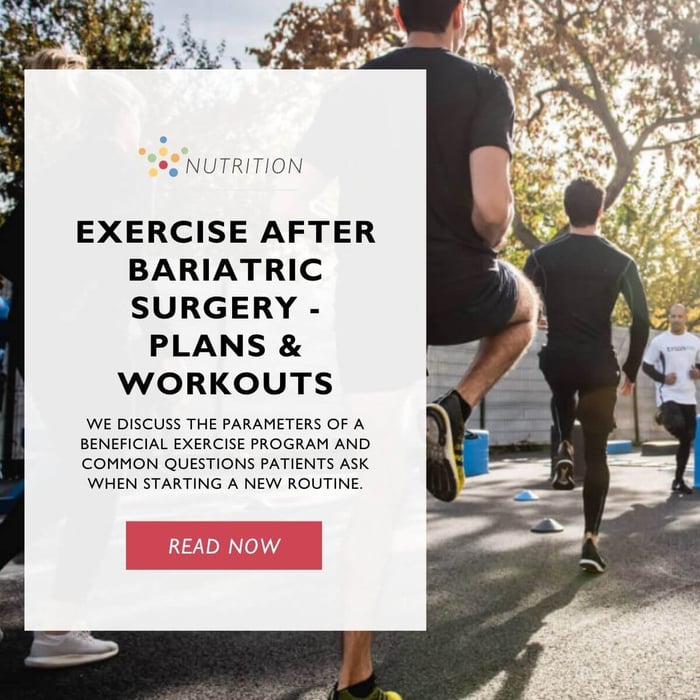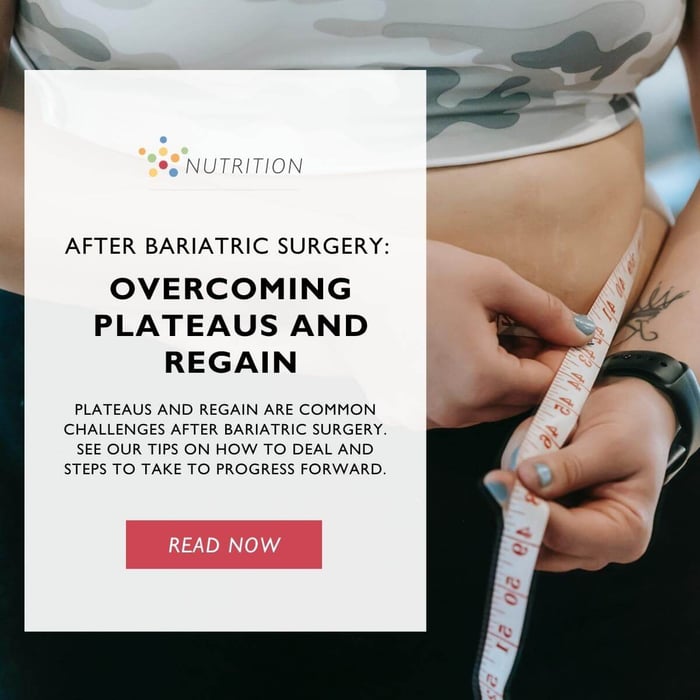Eating After Bariatric Surgery - 9 Rules for Success
Lifestyle
March 15th, 2023

People hate the term "rules", but they can be important, especially when it relates to behavior change. In order to help patients better achieve success, we'll refer to "rules" as "guidelines". So, what are some of the common "rules" or "guidelines" of bariatric surgery? And are they truly important? Let's find out, but first, please remember to follow your surgeon's recommendations and remember that every patient is different and your "guidelines" may be different than someone else's. Ultimately when eating after bariatric surgery, you have to find what works for you and helps you achieve the goals you have.
GUIDELINES
The following are a few guidelines that can truly help patients to achieve and maintain success and definitely make the transition to life after surgery smoother.
30 RULE
This guideline has four parts:
- Chew your food 30 times
- Take 30 minutes to eat food
- No drinking fluids 30 minutes before your meal, during your meal, or until 30 minutes after your meal
- Some programs may add a fourth part - Try to complete 30 minutes of physical activity per day
CHEW YOUR FOOD 30 TIMES
Who can chew yogurt 30 times – no one! However, the emphasis of this guideline is that you should chew your food thoroughly after bariatric surgery for a couple reasons: 1) it slows down your eating and 2) helps prevent food from getting stuck. Not all foods are going to take 30 chews, but you can try to chew your food to an applesauce consistency. It all depends on how big the bite is. Some experts recommend cutting your food up into tiny bites before you eat, so that you don’t have to chew as much to get to that pureed consistency.
By slowing down when you eat, it allows your brain time to realize how full your stomach is. You’ve probably heard the old saying, “it takes your brain 20 minutes to realize how full you are.” Try putting your silver wear down after each bite, and allow yourself the time you need to chew and taste the food before proceeding to the next bite.
After bariatric surgery, it takes a while to realize exactly how big (or rather how small) your new stomach is and what it will hold. If you don’t chew your food well, it’s possible to have larger bites of food get stuck, which is not fun! Just ask any post-op patient that has experienced this before if you haven’t.
TAKE 30 MINUTES TO EAT FOOD
This goes back to slowing down when you eat food so your brain realizes how full your stomach is. Now this is especially hard if you’re an early post-op patient because you’re eating such small portions that it may not take 30 minutes to eat. But as you get further out, this becomes more and more important. Some patients set a timer when they start eating, some use an egg timer between bites, and some put their fork down in-between bites. Others patient use toddler silverware to eat with, which not only forces you to take smaller bites, but can remind you to slow down when you see that “funny looking” spoon or fork. Whatever you find that helps, stick with it!
No drinking fluids with your meals, 30 minutes before, or until 30 minutes after.
Not all programs follow this guideline, but every patient should follow their program’s recommendations. So, here’s the belief and the reasoning behind this particular guideline. Think about your stomach as a strainer. If you only put liquid in the strainer it’s going to go straight through, but if you only put food in that strainer, it will drain through slowly. If you end up mixing water with the food, it thins it, allowing the food to go through the strainer faster (or your stomach faster). By doing this, you won’t feel as full, allowing you to eat more during your meals and you’ll become hungry sooner, which all equates to consuming more food and more calories throughout the day.
Many of you have probably been told to drink a glass of water if you became hungry in past diets. Why would you have been told to do that if this guideline is telling you not to drink before your meals? Well they weren’t wrong. So, then who’s right? In this situation, both are right. Sometimes hunger pains are truly thirst and by drinking water you satisfy that thirst and are not hungry anymore. However, if you’re hungry (truly hungry for food) and you drink water instead, postponing when you eat, it may cause some people to become ravenous due to the fact that they actually waited to eat. Then when they do eat, they’re so hungry, they eat whatever they can get their hands on, eat too fast, and eat too much. So the challenge becomes learning what your hunger cues are versus your thirst cues.

30 MINUTES OF PHYSICAL ACTIVITY DAILY
One of the current recommendations related to activity/exercise is to participate in 150-250 minutes of activity/exercise per week to promote weight loss. Weight bearing exercises are a great way to get active, while also promoting muscle gain and boosting metabolism1. (Ditch that treadmill!) But more importantly find what works for you. Any means of physical activity is beneficial. If you can get in 30 minutes per day, you will have completed 210 minutes by the end of the week. Don’t stress about doing all 30 minutes at once. Take a 10-minute walk at the beginning of the day, 10-minutes at lunch, and maybe 10-minutes when you get home. Making small lifestyle changes can go a long way. Try taking the stairs instead of the elevator, choose the further parking spot as opposed to the closer one, or scratch the grocery pickup, and go do it physically. Finding new hobbies like walking your golf round, picking up yoga, or going for a swim can be other ways to get you more active while still having fun! The most important thing here is doing what you can and not comparing what you’re doing to what others are doing. Work to increase what you can do slowly and safely. Most importantly, have fun with the activity/exercise you have chosen for yourself!
EAT YOUR PROTEIN FIRST
You’ve probably all heard this a time or two before. It’s one of the most commonly reported “guidelines” of bariatric surgery. The reason this is emphasized so much is for a couple reasons:
- Protein helps keep you feeling full by consuming healthy foods first
- Protein helps you to maintain muscle mass
Protein keeps you full. Here’s a quick run-down on digestion. Simple carbs (or white carbs) digest in about 30 minutes. Complex carbs (whole grains, raw fruits, raw vegetables, etc.) digest in about 60 minutes. Protein takes about 3-4 hours to digest, which leaves you feeling much fuller than if you ate only carbohydrates.
Protein maintains muscle mass. When someone loses weight, especially massive amounts of weight, it’s common to lose some muscle mass. How much, we don’t know, but we know some is normal. Why do you want to keep your muscle mass? Well muscle tissue is more active in the body than fat tissue; meaning muscle burns calories even when you’re resting (sleeping, sitting, etc.). Fat just sits there and takes up space, plus we know it doesn’t look that great. By taking in enough protein every day it helps reduce the amount of muscle mass you might lose, which is going to keep your metabolism higher than it would have been if you don’t eat enough protein daily. You want a higher metabolism so that you can burn as many calories per day as your body allows.
CONSUME ABOUT 60-90 GRAMS OF PROTEIN DAILY
Please remember, these are not specific guidelines, but general. Every patient is different and every program is different. Please follow the recommendations from your surgeon. In general, most gastric bypass, band, and sleeve patients need somewhere in the range of 60-90 grams of protein per day. If you’re a duodenal switch patient, you most likely have even higher requirements (check with your surgeon for specific recommendations), but may range to about 80-120 grams of protein per day.
How much is that? How do you know how much protein 60-90 grams per day is? Granted all foods vary in their protein content slightly, but in general if you picture a deck of cards in the box it’s equivalent to about 3 oz of protein (meat, fish, poultry, etc.). 3 oz. of protein has roughly 21 grams of protein (1 oz = 7 grams). This quick reference can be quite helpful in trying to determine if you’re getting enough protein daily. Once you get to where you can eat about 3 oz. of protein per meal, you can achieve roughly 60 grams of protein daily if you eat your three meals per day.
It is important to note that protein consumption should be spaced out throughout the day and not consumed all at once1. Our bodies can absorb 20-45 grams of protein at a time, so consuming anything more than that really doesn’t have any benefit for us and is ultimately a waste1. Although this is not typically a concern immediately post surgery, down the road it may be beneficial to keep in mind.

INCORPORATE FRUITS AND VEGETABLES
While immediately following surgery, there may be some fruits and vegetables that you shouldn’t eat or that may be difficult to eat. Talk to your program about which fruits and vegetables you can eat after surgery and how you should eat them. While the general recommendation of consuming 5-9 fruits and vegetables per day applies to the general public, you may not be able to apply that to a bariatric surgery patient. We all know and have all heard: “eat your protein.” Even though you want to focus on protein, it’s important to include fruits and vegetables, raw or cooked, as well. Fruits and vegetables not only provide wonderful nutrients, but they also provide fiber, which helps you feel full, among many other great health benefits. Try to pair your protein with either a fruit or vegetable with each meal and possibly snacks too (if you consume snacks). Smoothies are a great way to get both your fruit and veggie servings in. You can pack them with berries, bananas, spinach, kale, etc. Add some low fat greek yogurt for a protein, fiber, and nutrient dense meal or snack!
The further out you get from surgery, the easier it’ll be to start incorporating and tolerating fruits and vegetables. So happy eating!
WATCH SUGAR AND FAT
If you have chosen gastric bypass, you know that consuming high fat and high sugar may cause dumping syndrome. However, no matter which surgery you’ve chosen you will receive benefits from trying to limit your sugar and fat content. One rule of thumb that may be used is trying to keep fat and sugar in the single digits per serving (i.e., less than 10 grams of fat and less than 10 grams of sugar per serving listed on the label). While many foods do not meet this requirement, it doesn’t mean you can’t have them at all. Consider cutting the serving size in half or whatever reduction is necessary to make both fat and sugar single digits per serving.
Just because you’re supposed to limit your sweets post-op, it doesn’t make it any easier. The sugar cravings don’t magically disappear just because you are now post-op. So how do you avoid the sugar binge? Well, the easiest solution is to simply not buy the candy. Out of sight out of mind right? Although this works for some, for others it actually makes binging more likely whenever high sugar treats are around. If you fall under this category, then allow yourself to consistently consume the sugar whenever cravings arise. Just do so in a way that is appropriate by reducing the serving you are consuming. Don’t restrict yourself if you find yourself binging whenever you are around sugar. The same concept works for avoiding the over consumption of fat. Everyone is different, figure out which method works for you and helps you stay on track!
Of course, the least amount of sugar and fat consumed per day is best. But consuming a little bit here and there as cravings arise, is better than restricting, binging, and dumping syndrome.
Learn more about how to avoid Dumping Syndrome After Bariatric Surgery
CUT OUT THE BUBBLES
While this guideline is controversial, some experts believe cutting out the sodas or any bubble-type beverages (carbonated) will help reduce the risk of stretching your stomach over time. Carbonated beverages can cause back flow of stomach contents which can lead to bloating and discomfort1. Think about the scenario when you eat too much food, you’re feeling overstuffed, you take a sip of soda and then belch (yes, a little gross), but afterwards you don’t feel as stuffed. Seems that soda might allow people to consume more than they would have without the carbonation. While we don’t have any scientific research to prove or disprove this theory, it probably wouldn’t hurt. Again, as always, follow the recommendations provided by your surgeon and/or program.
Please remember that these are just “guidelines”; the word “rules” is very confining and constricting. In order to achieve success on your journey to wellness you have to find what guidelines work for you and what guidelines you are going to set for yourself. Everyone’s journey is different and your guidelines may not be the same as someone else’s.
1. Mahan, K., & Raymond, J. L. (2017). Nutrition and Bone Health In Kraus's Food & The Nutrition Care Process (14th ed., pp. 18-26). Essay, Elsevier Inc.
Bariatric Multivitamin Soft Chews

$32.99
Choose Celebrate’s bariatric multivitamin soft chews and experience the perfect blend of flavor and nutrition with our new and improved great tasting formula. Packed with essential vitamins and minerals, these bariatric multivitamins offer enhanced absorption, ensuring you get the most… read more



